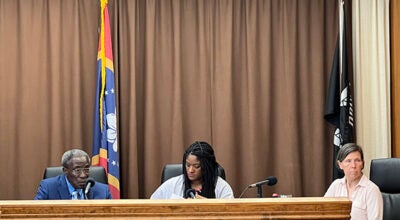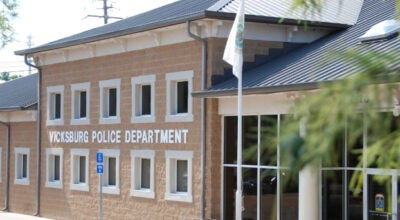National Guard headed to Grand Gulf
Published 12:00 am Monday, November 5, 2001
Private security guards armed with shotguns stop all vehicles entering Entergy’s Grand Gulf Nuclear Station in Port Gibson. (The Vicksburg Post/MELANIE DUNCAN)
[11/1/01] PORT GIBSON The Mississippi National Guard will soon be added to the heightened security measures in place at Grand Gulf Nuclear Station since Sept. 11.
Gov. Ronnie Musgrove said Wednesday that he has also asked Adjutant General James H. Lipscomb III to identify areas where security could be strengthened at seven airports in the state where guardsmen are now on duty.
“We have received credible threats regarding the security of public utilities and we are taking those threat seriously,” Musgrove said in a written statement.
Musgrove did not address whether there were specific threats to Grand Gulf or what utilities had been threatened.
Grand Gulf, located far from population centers and operated by Entergy Nuclear since 1985, has about 750 employees. It is the only nuclear-powered plant in Mississippi and generates electricity for customers in Mississippi, Louisiana and Arkansas.
Security at Grand Gulf and various federal agencies including local U.S. Army Corps of Engineers installation has been on high-alert since the attacks on New York and Washington, D.C.
Jill Smith, spokesman for Grand Gulf, said that when National Guard personnel arrive, they will be used to supplement the private security measures already in place.
Wednesday, the main entrance to Grand Gulf was manned by guards armed with shotguns and sidearms. A second entrance to the facility had been closed and blocked with a Entergy service truck.
Also, a Claiborne County Sheriff’s Department deputy’s car and a Mississippi Highway Safety Patrol car were stationed along the roadway outside the plant.
“They’re stopping everyone, even if they recognize them, and checking IDs,” Smith said.
The Federal Aviation Administration has temporarily banned private planes from flying near nuclear power plants after Attorney General John Ashcroft warned of possible new terrorist attacks.
The FAA on Tuesday imposed the restrictions “for reasons of national security.” The ban on flying within 11 miles of 86 nuclear plants including Grand Gulf and other nuclear sites expires Nov. 7.
Governors were briefed on the order in a conference call with Tom Ridge, director of Homeland Security, Musgrove said.
“We are taking steps to heighten security in accordance with the information received from Ridge’s office,” Musgrove said. “Our primary concern is the safety and security of the people of Mississippi.”
Smith said vital areas are designed to withstand high impacts. The nuclear reaction which gives off heat to boil water and make steam to spin generators takes place inside an 8-inch thick steel reactor vessel. The vessel is inside a primary containment building that is lined with stainless steel and has steel-reinforced concrete walls about 3 1/2 feet thick.
The number of soldiers that will be sent to Grand Gulf and how long they remain will be determined by Lipscomb, but no one has said when they expect the troops to arrive.
Guardsmen have been on duty since Oct. 5 at airports in Jackson, Tupelo, Columbus, Hattiesburg-Laurel, Gulfport, Meridian and Greenville.
U.S. Secretary of Transportation Norman Mineta is allowing governors to determine the best use of National Guard personnel at the airports. Musgrove said options could include patrols outside airport buildings and added personnel at security checkpoints.
Seven states already have put Army National Guard units on security duty at nuclear plants. They are New Jersey, New York, Massachusetts, Connecticut, Arizona, Kansas and Arkansas.





